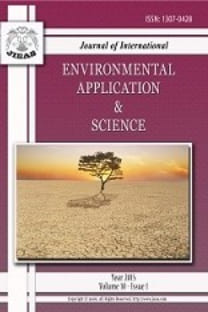The Effect of the Addition of Biodiesel in the Fossil Diesel to Its Characterizing Parameters
biodiesel, diesel, emissions, environment, characterization
___
[1] Roy G.D., 2004. Non-Renewable Energy Sources, New Delhi: Khanna Publications.[2] Kalam M.A., Husnawan M., and Masjuki H.H., 2003. Exhaust emission and combustion evaluation of coconut oil powered indirect injection diesel engine. Renewable Energy 28(15):2405-2415.
[3] Ramadhas A.S., Muraleedharan C., and Jayaraj S., 2005. Performance and emission evaluation of a diesel engine fueled with methyl esters of rubber seed oil. Renewable Energy 30:1789-1800.
[4] Balat, M., and Balat, H., 2010. Progress in biodiesel processing. Applied Energy 87: 1815- 1835.
[5] Sahoo P.K., Das L.M., Babu M.K., Arora P., Singh V.P., Kumar N.R. and Varyani T.S., 2009. Comparative evaluation of performance and emission characteristics of jatropha, karanja and polanga based biodiesel as fuel in a tractor engine. Fuel 88:1698-1707.
[6] Demirbas A. and M.F. Demirbas. 2011. Importance of algae oil as a source of biodiesel. Energy Conversion and Management 52:163-170.
[7] Lapuerta M. and O. Armas. 2008. Effect of biodiesel fuels on diesel engine emissions. Progress in Energy and Combustion Science 34:198-223.
[8] Narayana L., Gattamaneni R. and Subramani S., 2008. Combustion and emission characteristics of diesel engine fuelled with rice bran oil methyl ester and its diesel blends. Thermal Science 12:139-150.
[9] Knothe G., 2005. Dependence of biodiesel fuel properties on the structure of fatty acid alkyl esters. Fuel Processing Technology 86:1059-1070.
[10] Dunn R.O., 2005. Effect of antioxidants on the oxidative stability of methyl soyate (biodiesel). Fuel Processing Technology 86:1071-1085.
[11]. Demirbas, A. Biodiesel Impacts on Compression Ignition Engine (CIE): Analysis of Air Pollution Issues Relating to Exhaust Emissions; Energy Sources 2005, 27, 549-558.
[12]. Lue,Y.; Yeh, Y; Wu, C. The Emission Characteristics of a Small D.I. Diesel Engine Using Biodiesel Blended Fuels; J. Environ. Sci. Health 2001, A36(5),845-859.
[13]. Chen, K.; Lee, W.; Lin, Y.; Wu, T. A New Alternative Fuel for Reduction of Polycyclic Aromatic Hydrocarbon and Particulate Matter Emissions from Diesel Engines; Air & Waste Manage. Assoc. 2007, 57, 465-471.
[14]. Aulich, T.; DeWitt, M.; Corporan, E.; Larson, V.; Monroig, O.; Reich, R.; Seames, W. Impacts of Biodiesel on Pollutant Emissions of a JP-8-Fueled Turbine Engine; Air & Waste Manage. Assoc. 2005, 55, 940-949.
[15]. Harris, D. Exploring Chemical
- ISSN: 1307-0428
- Yayın Aralığı: Yılda 4 Sayı
- Başlangıç: 2006
- Yayıncı: Selçuk Üniversitesi
A Research On Awareness of Zoos: Landscape Architecture Students
Physical-chemical profile of drinking water in some villages of Zvecan, Kosovo
Florent DOBROSHI, İlirjan MALOLLARI, Petrit KOTORI, Blerim BARUTI
Evaluation of the Irrigation Waters of Çaycuma District in Terms of Certain Water Parameters
Şüheda Basire AKÇA, Sinem ÇOLAK, Nazmiye MARIM
Determination of Heavy Metals in the Lumbardhi River, Prizren - Kosovo
Sami GASHİ, Valon DURGUTİ, Fisnik LAHA, Fidan FEKA
Adnan AKÇİN, Tülay AYTAŞ AKÇİN
The Effect of the Addition of Biodiesel in the Fossil Diesel to Its Characterizing Parameters
Florent DOBROSHİ, Mazrreku ARMELA, Malollari ILİRJAN, Lorina LİÇİ
